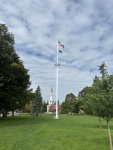250 years ago today, the 2nd Continental Congress adopted a letter to the Canadians:
"To the oppressed Inhabitants of Canada.
FRIENDS AND COUNTRYMEN,
Alarmed by the designs of an arbitrary Ministry, to extirpate the Rights and liberties of all America, a sense of common danger conspired with the dictates of humanity, in urging us to call your attention, by our late address, to this very important object. Since the conclusion of the late war, we have been happy in considering you as fellow-subjects, and from the commencement of the present plan for subjugating the continent, we have viewed you as fellow-sufferers with us. As we were both entitled by the bounty of an indulgent creator to freedom, and being both devoted by the cruel edicts of a despotic administration, to common ruin, we perceived the fate of the protestant and catholic colonies to be strongly linked together, and therefore invited you to join with us in resolving to be free, and in rejecting, with disdain, the fetters of slavery, however artfully polished. We most sincerely condole with you on the arrival of that day, in the course of which, the sun could not shine on a single freeman in all your extensive dominion. Be assured, that your unmerited degradation has engaged the most unfeigned pity of your sister colonies: and we flatter ourselves you will not, by tamely bearing the yoke, suffer that pity to be supplanted by contempt.
When hardy attempts are made to deprive men of rights, bestowed by the almighty, when avenues are cut thro' the most solemn compacts for the admission of despotism, when the plighted faith of government ceases to give security to loyal and dutiful subjects, and when the insidious stratagems and manœuvres of peace become more terrible than the sanguinary operations of war, it is high time for them to assert those rights, and, with honest indignation, oppose the torrent of oppression rushing in upon them. By the introduction of your present form of government, or rather present form of tyranny, you and your wives and your children are made slaves. You have nothing that you can call your own, and all the fruits of your labour and industry may be taken from you, whenever an avaritious governor and a rapacious council may incline to demand them. You are liable by their edicts to be transported into foreign countries to fight Battles in which you have no interest, and to spill your blood in conflicts from which neither honor nor emolument can be derived: Nay, the enjoyment of your very religion, on the present system, depends on a legislature in which you have no share, and over which you have no controul, and your priests are exposed to expulsion, banishment, and ruin, whenever their wealth and possessions furnish sufficient temptation. They cannot be sure that a virtuous prince will always fill the throne, and should a wicked or a careless king concur with a wicked ministry in extracting the treasure and strength of your country, it is impossible to conceive to what variety and to what extremes of wretchedness you may, under the present establishment, be reduced. We are informed you have already been called upon to waste your lives in a contest with us. Should you, by complying in this instance, assent to your new establishment, and a war break out with France, your wealth and your sons may be sent to perish in expeditions against their islands in the West indies. It cannot be presumed that these considerations will have no weight with you, or that you are so lost to all sense of honor. We can never believe that the present race of Canadians are so degenerated as to possess neither the spirit, the gallantry, nor the courage of their ancestors. You certainly will not permit the infamy and disgrace of such pusillanimity to rest on your own heads, and the consequences of it on your children forever. We, for our parts, are determined to live free, or not at all; and are resolved, that posterity shall never reproach us with having brought slaves into the world. Permit us again to repeat that we are your friends, not your enemies, and be not imposed upon by those who may endeavour to create animosities. The taking the fort and military stores at Ticonderoga and Crown-Point, and the armed vessels on the lake, was dictated by the great law of self-preservation. They were intended to annoy us, and to cut off that friendly intercourse and communication, which has hitherto subsisted between you and us. We hope it has given you no uneasiness, and you may rely on our assurances, that these colonies will pursue no measures whatever, but such as friendship and a regard for our mutual safety and interest may suggest. As our concern for your welfare entitles us to your friendship, we presume you will not, by doing us injury, reduce us to the disagreeable necessity of treating you as enemies. We yet entertain hopes of your uniting with us in the defence of our common liberty, and there is yet reason to believe, that should we join in imploring the attention of our sovereign, to the unmerited and unparalleled oppressions of his American subjects, he will at length be undeceived, and forbid a licentious Ministry any longer to riot in the ruins of the rights of Mankind.
Ordered, That the above Letter be signed by the president.
Ordered, That Mr. [John] Dickinson, and Mr. [ Thomas] Mifflin, be a committee to get the letter translated into the French language, and to have 1,000 copies of it, so translated, printed, in order to be sent to Canada, and dispersed among the Inhabitants there."
Apparently, the seizure of Fort Ticonderoga had caused unease in Canada.
Note that the Congress still labored under the impression that the king was deceived by bad ministers and that unity amongst the colonists would impress upon the British the need to address colonial concerns.





